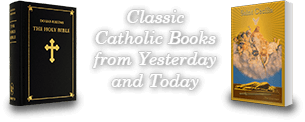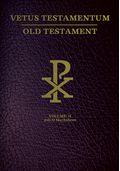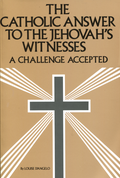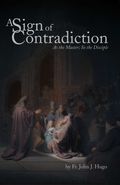Categories
Information
All Products
THE VULGATE IS THE OFFICIAL BIBLE OF THE CATHOLIC CHURCH
ALSO AVAILABLE AS A THREE VOLUME COMPLETE MATCHING SET
Vol. One includes the books from Genesis to Esther - 1080 pages
Vol. Two includes the books from Job to Machabees II -1040 pages
In keeping with the wishes of the Holy Father, Benedict XVI, Loreto Publications has published this truly unique edition of the Bible in Latin and English. Suitable either for students of theology and the Scriptures, for those studying Latin, or just for Catholics who wish to conduct themselves according to the mind of the Church, this edition brings together two classic versions of the Bible which have served Catholics well, down through the centuries.
- One Volume New Testament
- Two Volumes Old Testament
- Clear Typeface
- Burgundy bonded leather cover
- English column opposite Latin column
Download a free sample from this book.
Acts of the Apostles - Chapter 27:11-40
11 But the centurion believed the pilot and the master of the ship, more than those things which were said by Paul.
12 And whereas it was not a commodious haven to winter in, the greatest part gave counsel to sail thence, if by any means they might reach Phenice to winter there, which is a haven of Crete, looking towards the southwest and northwest.
They weather a great storm
13 And the south wind gently blowing, thinking that they had obtained their purpose, when they had loosed from Asson, they sailed close by Crete.
14 But not long after, there arose against it a tempestuous wind, called Euroaquilo.
15 And when the ship was caught, and could not bear up against the wind, giving up the ship to the winds, we were driven.
16 And running under a certain island, that is called Cauda, we had much work to come by the boat.
17 Which being taken up, they used helps, undergirding the ship, and fearing lest they should fall into the quicksands, they let down the sail yard, and so were driven.
18 And we being mightily tossed with the tempest, the next day they lightened the ship.
19 And the third day they cast out with their own hands the tackling of the ship.
20 And when neither sun nor stars appeared for many days, and no small storm lay on us, all hope of our being saved was now taken away.
Paul declares that all are to be saved
21 And after they had fasted a long time, Paul standing forth in the midst of them, said: You should indeed, O ye men, have hearkened unto me, and not have loosed from Crete, and have gained this harm and loss.
22 And now I exhort you to be of good cheer. For there shall be no loss of any man’s life among you, but only of the ship.
23 For an angel of God, whose I am, and whom I serve, stood by me this night,
24 Saying: Fear not, Paul, thou must be brought before Caesar; and behold, God hath given thee all them that sail with thee.
25 Wherefore, sirs, be of good cheer; for I believe God that it shall so be, as it hath been told me.
26 And we must come unto a certain island.
He exhorts them to take some food
27 But after the fourteenth night was come, as we were sailing in Adria, about midnight, the shipmen deemed that they discovered some country.
28 Who also sounding, found twenty fathoms; and going on a little further, they found fifteen fathoms.
29 Then fearing lest we should fall upon rough places, they cast four anchors out of the stern, and wished for the day.
30 But as the shipmen sought to fly out of the ship, having let down the boat into the sea, under color, as though they would have cast anchors out of the forepart of the ship,
31 Paul said to the centurion, and to the soldiers: Except these stay in the ship, you cannot be saved.
32 Then the soldiers cut off the ropes of the boat, and let her fall off.
33 And when it began to be light, Paul besought them all to take meat, saying: This day is the fourteenth day that you have waited, and continued fasting, taking nothing.
34 Wherefore I pray you to take some meat for your health’s sake; for there shall not an hair of the head of any of you perish.
35 And when he had said these things, taking bread, he gave thanks to God in the sight of them all; and when he had broken it, he began to eat.
36 Then were they all of better cheer, and they also took some meat.
37 And we were in all in the ship, two hundred threescore and sixteen souls.
38 And when they had eaten enough, they lightened the ship, casting the wheat into the sea.
The all escape unharmed
39 And when it was day, they knew not the land; but they discovered a certain creek that had a shore, into which they minded, if they could, to thrust in the ship.
40 And when they had taken up the anchors, they committed themselves to the sea, loosing withal the rudder bands;
Actus Apostolurum - Chapter 27:11-40
11 Centurio autem gubernatori et nauclero magis credebat, quam his quæ a Paulo dicebantur.
12 Et cum aptus portus non esset ad hiemandum, plurimi statuerunt consilium navigare inde, si quomodo possent, devenientes Phœnicen hiemare, portum Cretæ respicientem ad Africum et ad Corum. Patiuntur magnam tempestatem
13 Aspirante autem austro, æstimantes propositum se tenere, cum sustulissent de Asson, legebant Cretam.
14 Non post multum autem misit se contra ipsam ventus typhonicus, qui vocatur Euroaquilo.
15 Cumque arrepta esset navis, et non posset conari in ventum, data nave flatibus, ferebamur.
16 In insulam autem quamdam decurrentes, quæ vocatur Cauda, potuimus vix obtinere scapham.
17 Qua sublata, adjutoriis utebantur, accingentes navem, timentes ne in Syrtim inciderent, summisso vase sic ferebantur.
18 Valida autem nobis tempestate jactatis, sequenti die jactum fecerunt:
19 et tertia die suis manibus armamenta navis projecerunt.
20 Neque autem sole, neque sideribus apparentibus per plures dies, et tempestate non exigua imminente, jam ablata erat spes omnis salutis nostræ. Affirmat Paulus omnes salvandos esse
21 Et cum multa jejunatio fuisset, tunc stans Paulus in medio eorum, dixit: Oportebat quidem, o viri, audito me, non tollere a Creta, lucrique facere injuriam hanc et jacturam.
22 Et nunc suadeo vobis bono animo esse: amissio enim nullius animæ erit ex vobis, præterquam navis.
23 Astitit enim mihi hac nocte angelus Dei, cujus sum ego, et cui deservio,
24 dicens: Ne timeas, Paule: Cæsari te oportet assistere: et ecce donavit tibi Deus omnes qui navigant tecum.
25 Propter quod bono animo estote, viri: credo enim Deo quia sic erit, quemadmodum dictum est mihi.
26 In insulam autem quamdam oportet nos devenire.
Hortatur eos ad cibum sumendum
27 Sed posteaquam quartadecima nox supervenit, navigantibus nobis in Adria circa mediam noctem, suspicabantur nautæ apparere sibi aliquam regionem.
28 Qui et summittentes bolidem, invenerunt passus viginti: et pusillum inde separati, invenerunt passus quindecim.
29 Timentes autem ne in aspera loca incideremus, de puppi mittentes anchoras quatuor, optabant diem fieri.
30 Nautis vero quærentibus fugere de navi, cum misissent scapham in mare, sub obtentu quasi inciperent a prora anchoras extendere,
31 dixit Paulus centurioni et militibus: Nisi hi in navi manserint, vos salvi fieri non potestis.
32 Tunc absciderunt milites funes scaphæ, et passi sunt eam excidere.
33 Et cum lux inciperet fieri, rogabat Paulus omnes sumere cibum, dicens: Quartadecima die hodie exspectantes jejuni permanetis, nihil accipientes.
34 Propter quod rogo vos accipere cibum pro salute vestra: quia nullius vestrum capillus de capite peribit.
35 Et cum hæc dixisset, sumens panem, gratias egit Deo in conspectu omnium: et cum fregisset, cœpit manducare.
36 Animæquiores autem facti omnes, et ipsi sumpserunt cibum.
37 Eramus vero universæ animæ in navi ducentæ septuaginta sex.
38 Et satiati cibo alleviabant navem, jactantes triticum in mare.
Omnes evadunt incolumes
39 Cum autem dies factus esset, terram non agnoscebant: sinum vero quemdam considerabant habentem littus, in quem cogitabant si possent ejicere navem.
40 Et cum anchoras sustulissent, committebant se mari, simul laxantes juncturas gubernaculorum: et levato
192 pages, softcover
By Louise D'Angelo
This book presents to the reader the information which they need to protect their own faith or the faith of someone they love from the attacks of the Witnesses. This book was written after 16 years of toil and research by the author. There is nothing like it in print today. It contains full explanations of what the Witnesses believe and how they use the Bible to try to trap unsuspecting Catholics.
Fr. John Hugo - 422 Pages - EBOOK - PDF, Kindle, & EPUB
Fr. Onesimus Lacouture was a Jesuit who had the great gift of being a masterful director of souls. Being a Jesuit formed in the old mold of true Ignatian spirituality and deeply affected by the so-called “French School” of Cardinal Berulle, St. John Eudes, and St. Louis Marie de Montfort, his retreats, given to over 6000 American and Canadian priests, produced extraordinary results. His most well known disciple and good friend, Fr. Hugo, has produced for posterity, the Notes from those Ignatian retreats as given by Fr. Lacouture and subsequently by himself and many other priests.
A Sign of Contradiction is Fr. Hugo’s apologia for the work of Fr. Lacouture and the “spiritual movement” that grew spontaneously from the ardent, enlightened, and effective preaching of the retreats. He describes the movement, its opponents and its supporters as well as the revelatory doctrines so convincingly presented by Fr. Lacouture.
This book is spiritually motivating, historically informative, and powerfully illuminating in regard to the condition of the Church and the faithful in North America during the mid-twentieth century. The Gospel of Peace, and Applied Christianity (the retreat notes of Fr. Lacouture) by Fr. Hugo are also available from Loreto Publications.





